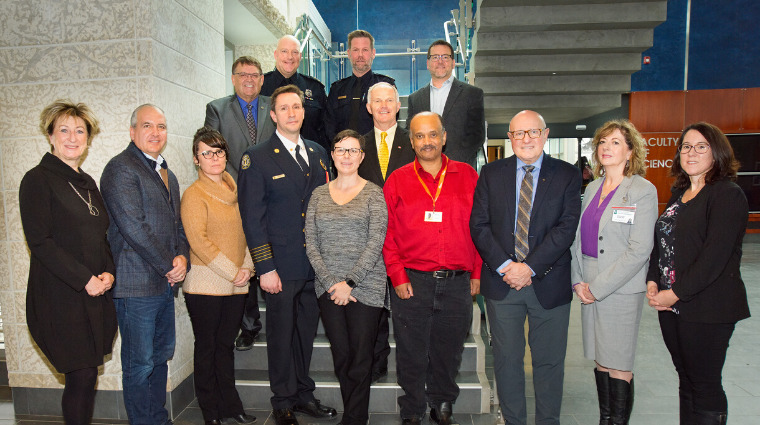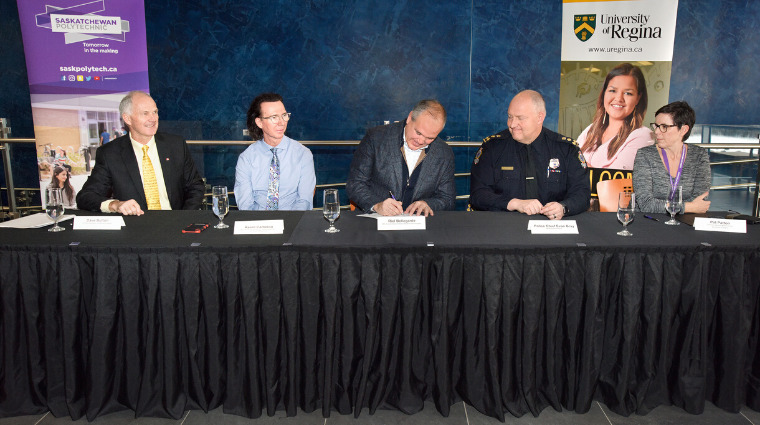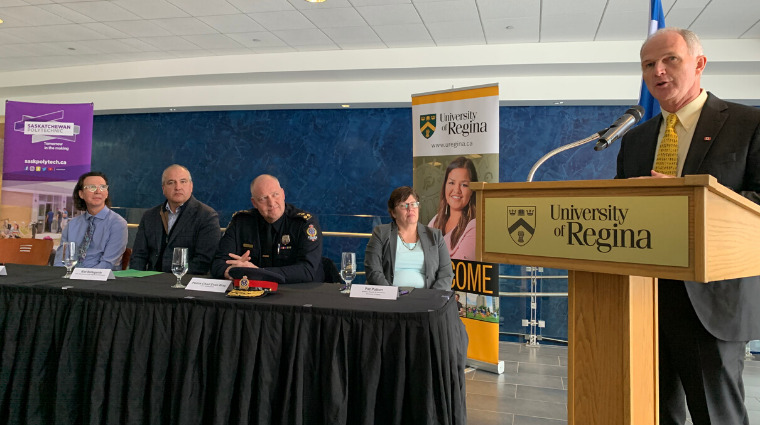
The Saskatchewan Indian Institute of Technologies, Saskatchewan Polytechnic and the
University of Regina have signed on to the Regina Human Service Partnership (RHSP)
Community Violence Threat Risk Assessment & Support Protocol.
“The addition of these three post-secondary institutes to the Protocol is a great step toward making our schools and community safer,” said City of Regina Police Chief Evan Bray and Co-chair of the RHSP. “Implementation of this Protocol supports collaborative planning among the partners to reduce violence and prevent traumatic events and is based on best practices identified by the North American Center for Threat Assessment and Trauma Response.”
The North American Center for Threat Assessment and Trauma Response (NACTATR) was established by J. Kevin Cameron in the aftermath of the Columbine High School shooting in Littleton Colorado and a second school shooting eight days later in Alberta, Canada. Cameron led the school-based crisis team in Canada.
“By bringing together police, educational leaders, social workers, mental health experts, and others, worrisome behaviors in schools, workplaces, or organizations can be identified and resolved,” said Cameron, Executive Director, NACTATR. “In the unfortunate situations where violence has occurred, NACTATR offers a comprehensive adaptive trauma response system that quickly restores stability and helps identify systemic interventions to restore or maintain public trust.”
The original RHSP Community Violence Threat Assessment and Support Protocol was signed in April of 2017 by the Regina Public and Catholic school boards, and Government of Saskatchewan and City of Regina agencies responsible for responding to, and preventing, violence in our communities.
“Unfortunately we have seen that violent incidents can occur at any time and in any community and organizations need to work together to identify those who may be planning violence to help prevent it, but also need to be prepared to provide appropriate responses and supports should an incident occur,” said Dave Button, Vice-President (Administration), University of Regina. “By signing this Protocol the University is joining our partner agencies in a proactive approach to preventing and responding to such incidents.”
The Protocol allows community organizations to collaborate on planning, identifying risks and sharing information and resources addressing traumatic violence and conflict.
“SIIT has made it our priority to continue to participate in Violence Threat Risk Assessment (VTRA) training, and activities which includes the development of partnerships with other educational institutions, community support organizations and law enforcement agencies,” said Riel Bellegarde, President and CEO, Saskatchewan Indian Institute of Technologies. “By engaging in activity focused on early intervention, we are looking forward to work together to promote safe spaces for all.”
“The health, safety and security of students, employees and visitors on our campuses is a top priority for Saskatchewan Polytechnic,” said Dr. Larry Rosia, President and CEO at Saskatchewan Polytechnic. "We recognize we can create safer environments by working together. By collaborating with partners of the Regina and Area Community Threat Assessment and Support Protocol we continue our work towards safer schools and campuses in education and post-secondary.”
The RHSP partners are committed to creating and maintaining safe environments in our
community. Members of the RHSP include: Regina Public Schools; Regina Catholic Schools;
Regina Police Service; Mental Health and Addiction Service (Regina), Integrated Health
Services – Urban, Saskatchewan Health Authority; Ministry of Social Services; Ministry
of Corrections and Policing; Regina Fire & Protective Services; City of Regina Parks,
Recreation and Cultural Services; Regina Open Door Society; Saskatchewan Indian Institute
of Technologies; Saskatchewan Polytechnic; and University of Regina.


